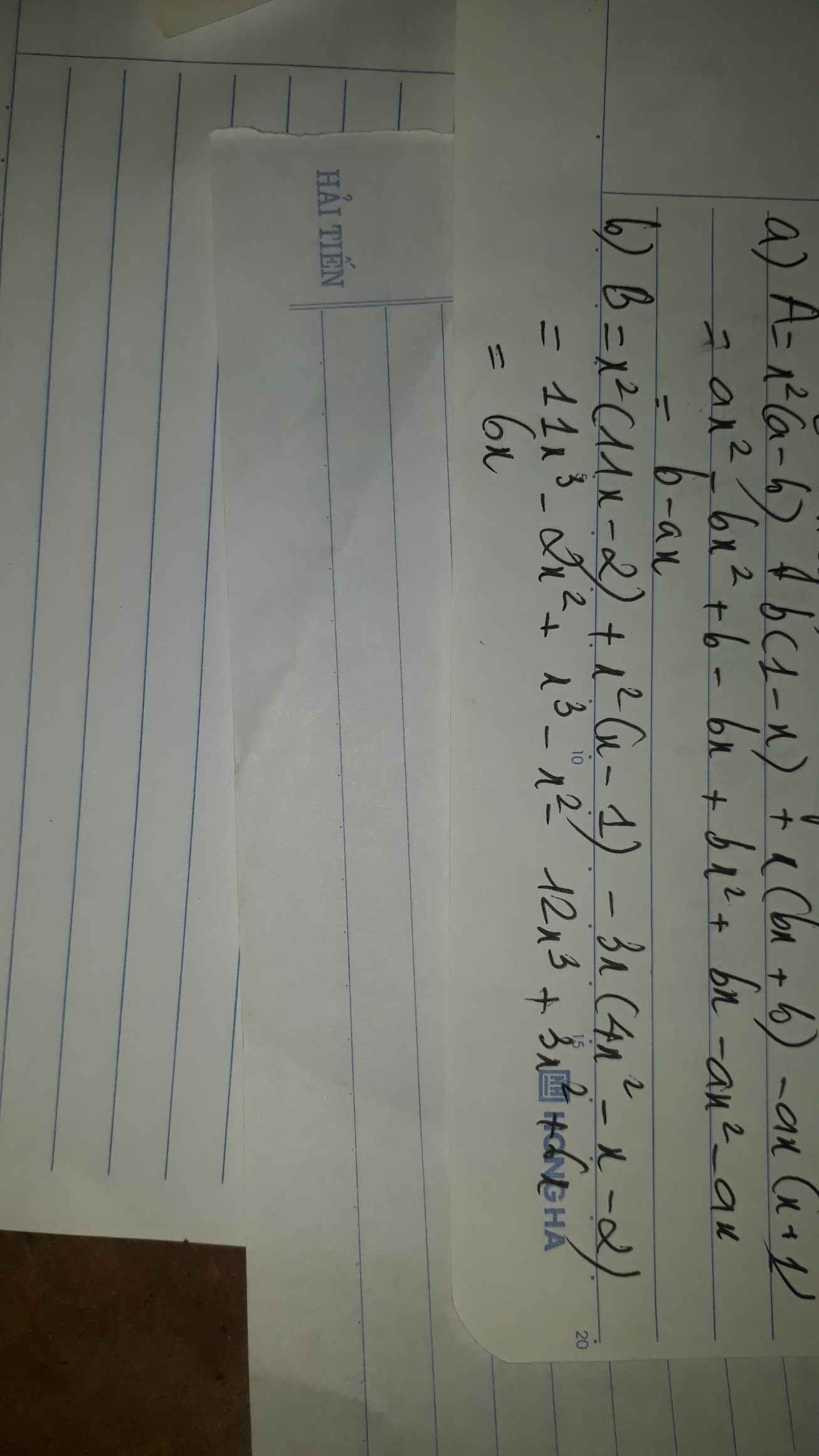4𝑥 − 8 + 3𝑥(𝑥 − 2) = 0

Những câu hỏi liên quan
Rút gọn a) 𝐴 = 𝑥^ 2 (𝑎 − 𝑏) + 𝑏(1 − 𝑥) + 𝑥(𝑏𝑥 + 𝑏) − 𝑎𝑥(𝑥 + 1) b) 𝐵 = 𝑥 2 (11𝑥 − 2) + 𝑥 2 (𝑥 − 1) − 3𝑥(4𝑥 2 − 𝑥 − 2)
b: Ta có: \(B=x^2\left(11x-2\right)+x^2\left(x-1\right)-3x\left(4x^2-x-2\right)\)
\(=11x^3-2x^2+x^3-x^2-12x^3+3x^2+6x\)
\(=6x\)
Đúng 0
Bình luận (0)
1.Giải các phương trình saua.a.√4𝑥−92𝑥−5b.√𝑥2−7𝑥+103𝑥−1c.√𝑥+4−√1−𝑥√1−2𝑥d.|3x-1|x+3e.|x+2||6-3x|
Đọc tiếp
1.Giải các phương trình saua.
a.√4𝑥−9=2𝑥−5
b.√𝑥2−7𝑥+10=3𝑥−1
c.√𝑥+4−√1−𝑥=√1−2𝑥
d.|3x-1|=x+3
e.|x+2|=|6-3x|
Bài 8.Tìm nghiệm của các đa thức sau:
a) 𝑥2 -8x +7 c) 3𝑥2 +4x – 4 e) 5𝑥2 -16x +3
b) 𝑥2 + 𝑥 - 20 d) 3𝑥2 - 4𝑥 - 7 f) 𝑥2 + 3𝑥 - 10
a) Ta có: \(x^2-8x+7=0\)
\(\Leftrightarrow\left(x-1\right)\left(x-7\right)=0\)
\(\Leftrightarrow\left[{}\begin{matrix}x=1\\x=7\end{matrix}\right.\)
b) Ta có: \(x^2+x-20=0\)
\(\Leftrightarrow\left(x+5\right)\left(x-4\right)=0\)
\(\Leftrightarrow\left[{}\begin{matrix}x=-5\\x=4\end{matrix}\right.\)
c) Ta có: \(3x^2+4x-4=0\)
\(\Leftrightarrow3x^2+6x-2x-4=0\)
\(\Leftrightarrow3x\left(x+2\right)-2\left(x+2\right)=0\)
\(\Leftrightarrow\left(x+2\right)\left(3x-2\right)=0\)
\(\Leftrightarrow\left[{}\begin{matrix}x=-2\\x=\dfrac{2}{3}\end{matrix}\right.\)
d) Ta có: \(3x^2-4x-7=0\)
\(\Leftrightarrow3x^2-7x+3x-7=0\)
\(\Leftrightarrow\left(3x-7\right)\left(x+1\right)=0\)
\(\Leftrightarrow\left[{}\begin{matrix}x=\dfrac{7}{3}\\x=-1\end{matrix}\right.\)
e) Ta có: \(5x^2-16x+3=0\)
\(\Leftrightarrow5x^2-15x-x+3=0\)
\(\Leftrightarrow\left(x-3\right)\left(5x-1\right)=0\)
\(\Leftrightarrow\left[{}\begin{matrix}x=3\\x=\dfrac{1}{5}\end{matrix}\right.\)
f) Ta có: \(x^2+3x-10=0\)
\(\Leftrightarrow x^2+5x-2x-10=0\)
\(\Leftrightarrow\left(x+5\right)\left(x-2\right)=0\)
\(\Leftrightarrow\left[{}\begin{matrix}x=-5\\x=2\end{matrix}\right.\)
Đúng 2
Bình luận (0)
a)
\(x^2-8x+7=0\text{⇔}\text{⇔}x^2-7x-x-7=\left(x-7\right)\left(x-1\right)=0\text{⇔}\left[{}\begin{matrix}x=1\\x=7\end{matrix}\right.\)
Vậy nghiệm của đa thức : \(S=\left\{1;7\right\}\)
c)
\(3x^2+4x-4=0\text{⇔}3x^2+6x-2x-4=\left(3x-2\right)\left(x+2\right)=0\text{⇔}\left[{}\begin{matrix}x=\dfrac{2}{3}\\x=-2\end{matrix}\right.\)
Vậy nghiệm của đa thức : \(S=\left\{\dfrac{2}{3};-2\right\}\)
b)
\(x^2+x-20=0⇔\left(x-4\right)\left(x+5\right)=0\text{⇔}\left[{}\begin{matrix}x=4\\x=-5\end{matrix}\right.\)
d)
\(3x^2-4x-7=0\text{⇔}\left(3x-7\right)\left(x+1\right)=0\text{⇔}\left[{}\begin{matrix}x=-1\\x=\dfrac{7}{3}\end{matrix}\right.\)
e)
\(5x^2-16x+3\text{⇔}\left(x-3\right)\left(5x-1\right)=0\text{⇔}\left[{}\begin{matrix}x=3\\x=\dfrac{1}{5}\end{matrix}\right.\)
f)
\(x^2+3x-10=0\text{⇔}\left(x-2\right)\left(x+5\right)=0\text{⇔}\left[{}\begin{matrix}x=2\\x=-5\end{matrix}\right.\)
\(\)
Đúng 1
Bình luận (0)
Bài 1: Phân tích các đa thức thành nhân tử
1. 4𝑥 2 – 6x
2. –28𝑥 2𝑦 5 – 14𝑥 3𝑦 4 – 21𝑦 3
3. 4x(a – b) + 6xy(b – a)
4. (6x + 3) – (2x – 5)(2x + 1)
5. 4(𝑥 − 3) 2 + 2x(3 – x)
6. 𝑥 4 + 2𝑥 3 – 4x – 4 7. 2x(x + y) – x – y
8. (3𝑥 − 1) 2 – (𝑥 + 3) 2
đều có số mũ hết nha, giúp dùm tui vs
1,\(=4x\left(x-\dfrac{3}{2}\right)\)
2,\(=-7y^3\left[2x^2y\left(2y+x\right)+3\right]\)
3, = 4x(a-b)-6xy(a-b)
=2x(a-b)(2-3y)
4,
=3(2x+1)-(2x-5)(2x+1)
=(3-2x+5)(2x+1)
=(8-2x)(2x+1)
=2(4-x)(2x+1)
Đúng 0
Bình luận (1)
5: \(4\left(x-3\right)^2+2x\left(3-x\right)\)
\(=\left(x-3\right)\left(4x-12\right)-2x\left(x-3\right)\)
\(=\left(x-3\right)\left(2x-12\right)\)
\(=2\left(x-6\right)\left(x-3\right)\)
8: \(\left(3x-1\right)^2-\left(x+3\right)^2\)
\(=\left(3x-1-x-3\right)\left(3x-1+x+3\right)\)
\(=\left(2x-4\right)\left(4x+2\right)\)
\(=4\left(x-2\right)\left(2x+1\right)\)
Đúng 0
Bình luận (0)
Bài 8: Tìm giá trị nhỏ nhất của
A=√𝑥2 −4𝑥+25 ,
C=3+√𝑥 √𝑥+1
B=√𝑥2 −6𝑥+30
D=√𝑥2 −4𝑥+7+√2
bạn viết câu hỏi dưới dạng trực quan để mn dễ hiểu nhé!
Đúng 0
Bình luận (0)
Tìm x , biết rằng
a) 𝑥3 - 64𝑥 0
b) 𝑥3 - 4𝑥2 -4𝑥
c)𝑥2 - 16 - (𝑥 - 4) 0
d)(2𝑥 + 1)2 (3 + 𝑥)
e)𝑥3 - 6𝑥2 + 12𝑥 - 8 0
f)𝑥3 - 7𝑥 - 6 0
Đọc tiếp
Tìm x , biết rằng
a) 𝑥3 - 64𝑥 = 0
b) 𝑥3 - 4𝑥2 = -4𝑥
c)𝑥2 - 16 - (𝑥 - 4) = 0
d)(2𝑥 + 1)2 = (3 + 𝑥)
e)𝑥3 - 6𝑥2 + 12𝑥 - 8 = 0
f)𝑥3 - 7𝑥 - 6 = 0
a) x³ - 64x = 0
x(x² - 64) = 0
x(x - 8)(x + 8) = 0
x = 0 hoặc x - 8 = 0 hoặc x + 8 = 0
*) x - 8 = 0
x = 8
*) x + 8 = 0
x = -8
Vậy x = -8; x = 0; x = 8
b) x³ - 4x² = -4x
x³ - 4x² + 4x = 0
x(x² - 4x + 4) = 0
x(x - 2)² = 0
x = 0 hoặc (x - 2)² = 0
*) (x - 2)² = 0
x - 2 = 0
x = 2
Vậy x = 0; x = 2
c) x² - 16 - (x - 4) = 0
(x - 4)(x + 4) - (x - 4) = 0
(x - 4)(x + 4 - 1) = 0
(x - 4)(x + 3) = 0
x - 4 = 0 hoặc x + 3 = 0
*) x - 4 = 0
x = 4
*) x + 3 = 0
x = -3
Vậy x = -3; x = 4
d) (2x + 1)² = (3 + x)²
(2x + 1)² - (3 + x)² = 0
(2x + 1 - 3 - x)(2x + 1 + 3 + x) = 0
(x - 2)(3x + 4) = 0
x - 2 = 0 hoặc 3x + 4 = 0
*) x - 2 = 0
x = 2
*) 3x + 4 = 0
3x = -4
x = -4/3
Vậy x = -4/3; x = 2
e) x³ - 6x² + 12x - 8 = 0
(x - 2)³ = 0
x - 2 = 0
x = 2
f) x³ - 7x - 6 = 0
x³ + 2x² - 2x² - 4x - 3x - 6 = 0
(x³ + 2x²) - (2x² + 4x) - (3x + 6) = 0
x²(x + 2) - 2x(x + 2) - 3(x + 2) = 0
(x + 2)(x² - 2x - 3) = 0
(x + 2)(x² + x - 3x - 3) = 0
(x + 2)[(x² + x) - (3x + 3)] = 0
(x + 2)[x(x + 1) - 3(x + 1)] = 0
(x + 2)(x + 1)(x - 3) = 0
x + 2 = 0 hoặc x + 1 = 0 hoặc x - 3 = 0
*) x + 2 = 0
x = -2
*) x + 1 = 0
x = -1
*) x - 3 = 0
x = 3
Vậy x = -1; x = -1; x = 3
Đúng 1
Bình luận (1)
a,x\(^3\)-64=0
x\(^3\) =64
=>x=3
b,x\(^3\)-4x\(^2\)=-4x
x\(^3\)-4x\(^2\)+4x=0
x(x\(^2\)-4x+4)=0
x(x-2)\(^2\)=)
TH1:x=0
TH2:x-2=0
=>x=2
c,x\(^2\)-16-(x-4)=0
(x+4)(x-4)-(x-4)=0
(x-4)(x+4-1)=0
(x-4)(x+3)=0
TH1:x-4=0
=>x=4
TH2:x+3=0
=>x=-3
d,(2x+1).2=3+x
4x+2-3-x=0
3x-1=0
x=\(\dfrac{1}{3}\)
e,x\(^3\)-6x\(^2\)+12x-8=0
(x-2)\(^3\)=0
=>x-2=0
=>x=2
f,x\(^3\)-7x+6=0
x\(^3\)-x-6x+6=0
x(x\(^2\)-1)-6(x-1)=0
x(x+1)(x-1)-6(x-1)=0
(x-1)(x\(^2\)+x-6)=0
TH1:x-1=0
=>x=1
TH2:x\(^2\)+x-6=0
x\(^2\)+3x-2x-6=0
x(x+3)-2(x+3)=0
(x+3)(x-2)=0
=>x+3=0 =>x-2=0
+>x=-3 =>x=2
Đúng 0
Bình luận (0)
d,(2x+1)\(^2\)=(3+x)\(^2\)
4x\(^2\)+4x+1-9-6x-x\(^2\)=0
3x\(^2\)-2x-8=0
3x\(^2\)-6x+4x-8=0
3x(x-2)+4(x-2)=0
(3x+4)(x-2)=0
TH1:3x+4=0 TH2:x-2=0
=>x=\(\dfrac{-4}{3}\) =>x=2
Đúng 0
Bình luận (0)
Tìm 𝑥
2𝑥2+3𝑥−4𝑥−6=0
\(2x^2-x-6=0\Leftrightarrow\left[{}\begin{matrix}x-2=0\\x+\dfrac{3}{2}=0\end{matrix}\right.\left[{}\begin{matrix}x=2\\x=\dfrac{-3}{2}\end{matrix}\right.\)
Đúng 2
Bình luận (0)
a) 2𝑥(𝑥2−9)=0
b) 2𝑥(𝑥−2021)−𝑥+2021=0
c) 4𝑥2−16𝑥=0
d) (3𝑥+7)2−(𝑥+1)2=0
\(a,\Leftrightarrow2x\left(x-3\right)\left(x+3\right)=0\\ \Leftrightarrow\left[{}\begin{matrix}x=0\\x=3\\x=-3\end{matrix}\right.\\ b,\Leftrightarrow\left(2x-1\right)\left(x-2021\right)=0\\ \Leftrightarrow\left[{}\begin{matrix}x=\dfrac{1}{2}\\x=2021\end{matrix}\right.\\ c,\Leftrightarrow4x\left(x-4\right)=0\\ \Leftrightarrow\left[{}\begin{matrix}x=0\\x=4\end{matrix}\right.\\ d,\Leftrightarrow\left(3x+7-x-1\right)\left(3x+7+x+1\right)=0\\ \Leftrightarrow\left(2x+6\right)\left(4x+8\right)=0\\ \Leftrightarrow\left(x+3\right)\left(x+2\right)=0\\ \Leftrightarrow\left[{}\begin{matrix}x=-3\\x=-2\end{matrix}\right.\)
Đúng 1
Bình luận (2)
(3𝑥−2)(4−𝑥)=0
\(\left[{}\begin{matrix}3x-2=0\\4-x=0\end{matrix}\right.\Leftrightarrow\left[{}\begin{matrix}x=\dfrac{2}{3}\\x=4\end{matrix}\right.\)
Đúng 2
Bình luận (0)
3x-2=0
3x=2
X=2/3
hoặc 4-x=0
X=4-0
X=4
Đúng 0
Bình luận (0)



























